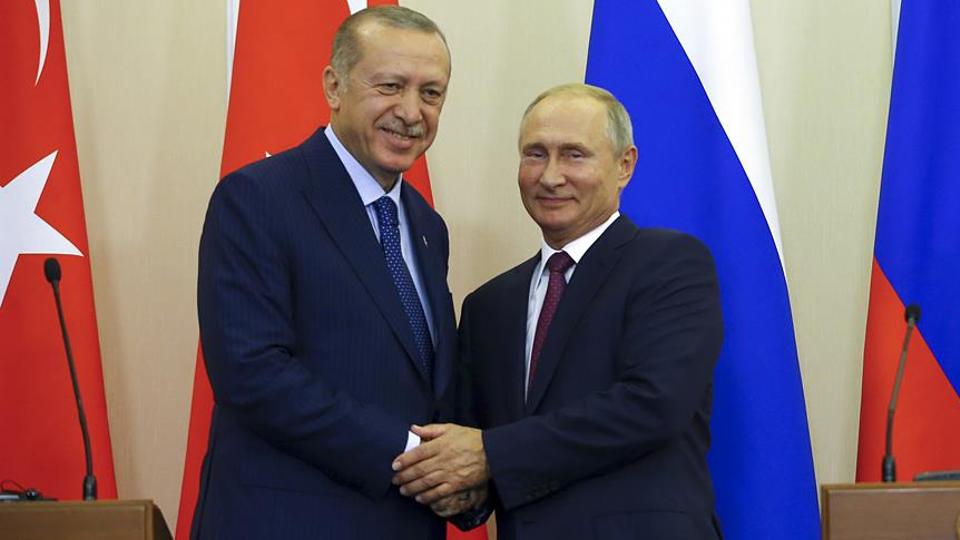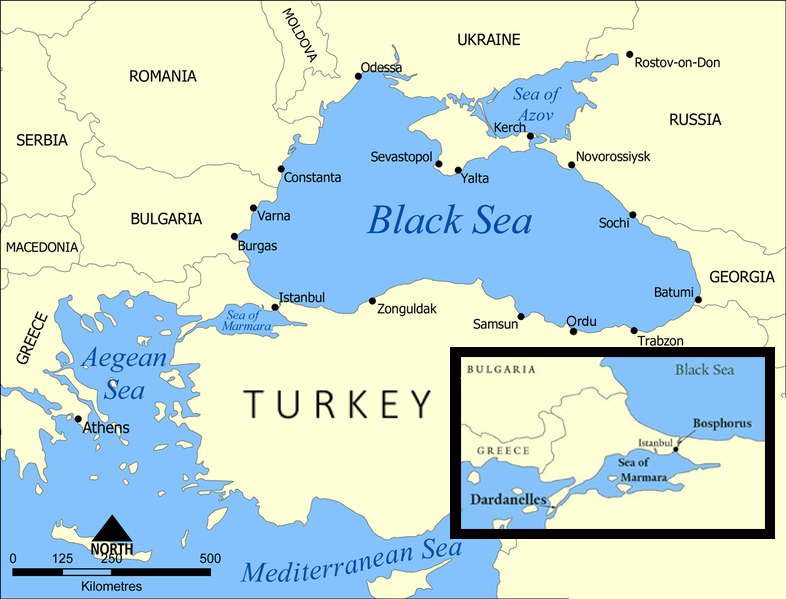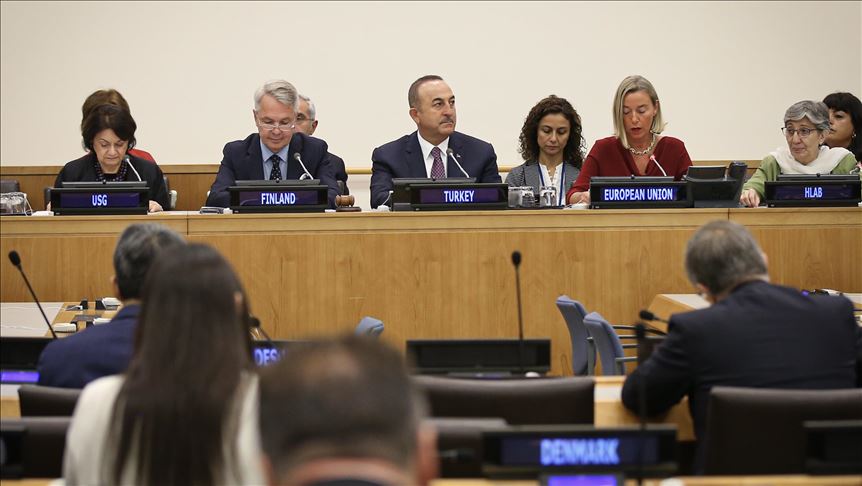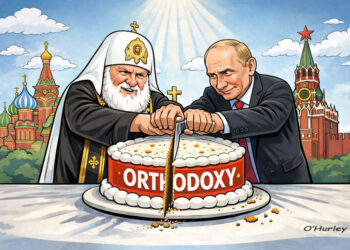by Miceál O’Hurley
ANKARA — Diplomacy in Ireland – European Diplomat has published several times in the last month, under my by-line, that the Republic of Turkey, and in particular President Recep Tayyip Erdoğan, have a vital role to play in the security crisis created by Russia during their latest threat to Ukraine and Europe. During my interview with Ian Robertson, Ph.D. of Trinity College Dublin (Delusions and Destiny – Inside the Dark Mind of Vladimir Putin: Ian Robertson, Ph.D. of Trinity College Dublin on the Psychological Makeup of Putin, 14 February 2022), I asked if Erdoğan might not be a better negotiator with Russia given how Putin views Erdoğan with begrudging respect. I have long believed that Turkey’s under-valued geo-political importance has been ignored to the detriment of European security throughout this crisis. Moreover, I believe Erdoğan is the right man, in the right place, at the right time to help resolve this crisis.

Pundits have been quick to dismiss the role Turkey can play in de-escalating Russia’s existential threat to Ukraine and continuing destabilisation (if not dissection) of the current European security architecture. Some claim that Putin would not respect Erdoğan because he doesn’t have a nuclear arsenal. This may be a factor, but it ignores the significant firepower under Turkey’s control and its long-standing NATO membership which puts an estimated 50-nuclear weapons on Turkish soil at Incirlik Air Base. Putin could only ignore this at his peril. Moreover, Turkey’s military capability has been proven in defeating the Daesh in Syria and in protecting its borders (and the gateway to Europe) in what can only be described as technically and tactically achieved victories.
Yet all this simply ignores the other reality that militates towards Putin respecting, if not outright fearing the power within Erdoğan’s iron fist – the Dardanelles and Bosphorus straits. So critical is Turkey’s geography that in antiquity, the Bosphorus straits were a critical factor in preserving the Eastern Roman Empire, what we now call Byzantium, until Constantinople fell to Ottoman-Turk forces led by Mehmed II in 1453. No student of history would discount the role the Bosphorus straits played in maintaining Byzantium as the longest-lived empire in recorded human history.

Erdoğan has long been acutely aware of the lawful power Turkey wields by exercising both geographical and legal authority over access to the Dardanelles and Bosphorus straits. Under the authority of the international Montreux Convention, Turkey has both authority and control over the passage of vessels between the Mediterranean and Black Sea. Any glance at the map would immediately indicate to even the most casual observer just how strategically important this aquatic gateway truly is. Turkey stands poised to regulate traffic that would effectively inhibit any navy that desires to use force and firepower in an attempt to command the Sea of Azov and the Black Sea – as Russia has demonstrated it is willing to do through its latest naval exercises in these waters.
Signed in 1936 during the dark days leading up to World War II, The Montreux Convention was the brainchild of the still nascent Republic of Turkey who was rightly concerned over expansionist moves in the region. This was no mere act of self-interest but a monumental effort to help stabilise the region. Working with their partners, the signatories of the 1923 Treaty of Lausanne, Turkey proposed changing the way the straits are monitored. Noting the evolution of regional and world threats, Turkey asked for full authority to regulate passage in this strategic bottleneck. Consultations and negotiations ensued with stakeholder world powers, including the United Kingdom, the Soviet Union, France and others. In an echo of today’s crisis, The Montreux Convention memorialised the agreement that Turkey not only would, but should regulate the straits in the interest of protecting commerce, freedom of navigation and promoting regional peace and security.

The Montreux Convention provides Turkey regulatory control over maritime access through the Bosphorus and Dardanelles. This explicitly includes the authority to regulate the transit of any and all naval warships (including submarines). Critically, in times of peace, Turkey is entrusted with guaranteeing freedom of navigation for all civilian vessels providing for the restriction of the transit of ships not belonging to Black Sea countries. In times of conflict, Turkey is authorised to close the straits to all foreign warships, or deny transit when the region is threatened by aggression. And, consistent with what in the future would become Article 51 of the UN Charter, Turkey is empowered to refuse transit for merchant ships from countries at war with Turkey and to enhance fortification of their interests for individual or collective self-defense. Putin, who possesses a comprehensive knowledge of the “Great Patriotic War,” is more than acutely aware of the immense power of The Montreaux Convention. During World War II, the authority vested in Turkey by the Montreux Convention operationally prevented the Axis powers from sending naval forces through the Straits to attack the Soviet Union. The critical importance Turkey can play is not lost on Putin.
Here, an instructive history lesson (not homage) seems necessary given Europe’s ongoing failure to grasp the dynamic opportunity Erdoğan presents with Turkey’s offers of mediation.
Given the incredible, lawful authority invested in Turkey by The Montreaux Convention, it is hard to understand why Europe has not paid more attention to Erdoğan’s offers of mediating the current dispute. Turkey, dwarfed by geography and firepower by the Russian Federation, has still managed to deal with Russia effectively as an equal. Erdoğan may not command Putin’s respect (it is doubtful anyone does), but he has proven that Putin cedes him a level of esteem other European leaders have failed to obtain. Recalling the events of the Autumn of 2015 gives proof of this.
Turkey has long had a complicated but successful working relationship with Russia. In November 2015, Erdoğan demonstrated superior diplomatic skills in averting a regional conflict after a Turkish Air Force F-16 fighter jet shot down a Russian Sukhoi Su-24M attack aircraft near the Syria–Turkey border. Un-cowed by Russia’s demands for an apology, Erdoğan relied upon facts-on-the-ground and released information to prove that the Russian Su-24M had, along with another Russian aircraft, entered into Turkish airspace and despite numerous warnings by Turkey to depart the area, was eventually fired upon within Turkish airpsace causing the Russian aircraft to crash in Syria. Despite inordinate Russian pressure and threats, Erdoğan kept his cool. In 2016, Erdoğan did express appropriate sympathy for the death of the pilots and without admitting error (Turkey was fully justified in its actions), he quelled the uproar and returned the bilateral relations between Turkey and Russia to their complicated, but manageable routine. Few world leaders would have had the courage to rely on facts, or the personal character needed to stand-up to the Kremlin and Putin as did Erdoğan.
There are plethora more reasons why the West should look to engaging Erdoğan as an interlocutor with Russia over its latest threats to European security. Turkey resides in region affected by numerous active, frozen and potential conflicts and has played a pioneering role in raising awareness and creating capacity for mediation, to achieve sustained peace, stability and prosperity in its neighbourhood and beyond. The significance of this cannot be easily dismissed.
Turkey has proven themselves a creative and capable partner with non-regional actors in Europe for the benefit of world peace and security. The “Mediation for Peace” initiative, an imaginative and practical collaborative initiative launched at the United Nations in New York by Turkey and Finland in September, 2010, was created to effectively enhance the prominence of mediation in preventive diplomacy and conflict resolution. In an era where wars in the Middle East and Afghanistan were breaking-out with and alarming regularity, and fully realising the dynamic that asymmetrical threats were playing in engendering conflict, the Turkish-Finnish initiative focused on not only allocating the much needed increase of resources for mediation efforts but in directing them at conflict prevention as well as conflict remediation. By universal consensus, the UN General Assembly adopted a Resolution on 22 June 2011 declaring the “Mediation for Peace” initiative to be of “special importance“. A monumental step that too often goes uncelebrated, it is widely recognised today by scholars and practitioners of international mediation and conflict resolution as landmark peace initiative, being the first resolution adopted by the UN on the matter.

Turkey has also demonstrated it has directed its energies and imagination on enhancing European security too. Building on the success of the “Mediation for Peace” initiative on the world stage, on 5 March 2014, Turkey collaborated with Finland and the then Swiss Presidency of the OSCE, announcing the formation of the “Group of Friends of Mediation” (GoF) in Vienna. Beyond serving as a platform for collaboration and sharing experiences, the GoF actively raises awareness throughout the OSCE membership of the importance of mediation as an effective tool for peaceful conflict resolution. During the most recent GoF meeting, hosted by Finland in Vienna on 27 October 2021, Directors General from Turkey, Finland and Switzerland collaborated as Co-Chairs promoting the significance of mediation in the OSCE. Significant emphasis was placed by the GoF on ways and means for increasing the efficiency of the role of the OSCE. Turkey’s leadership in the area of promoting the reinforcement of the OSCE in conflict resolution demonstrates a critical awareness and respect for the kinds of international institutions that will prove indispensable organs in ensuring any durable peace arises from efforts to avert Russia from unleashing all-out warfare on a scale not experienced in Europe since World War II.

Erdoğan has proven that Turkey is both comfortable and experienced in operating as a collaborator for peace in Europe. It serves as a Co-Chair of Groups of Friends of Mediation at the UN; provides leadership in conflict resolution and institutional reinforcement of the OSCE; it plays a critical role within The Organisation of Islamic Cooperation; and, Turkey has provided critical, practical learning opportunities for European leaders by hosting international mediation conferences and the “Mediation for Peace” Certificate Programme. Turkey’s engagement in conflict resolution over a broad and international geography in recent years commends it well to consideration for use in forging a new European security apparatus, even if a transitory one.
At risk of being accused of having written a hagiography, I will only point out the obvious that seems to have been overlooked so far in Europe concerning Turkey’s bona fides in conflict resolution — in regions that have long defied cooperation, threat reduction and conflict resolution, Turkey (and Erdoğan himself) have played an indispensable role in promoting reconciliation in Iraq, Lebanon and Kyrgyzstan. Europe is well aware of Turkey’s engagement in 2-separate trilateral cooperation processes launched with the participation of Serbia and Croatia which have proven instrumental in achieving durable peace and stability in Bosnia-Herzegovina. Then there are the graveyards of empires – Afghanistan and Pakistan – where Turkey’s leadership in a trilateral cooperation mechanism and “Heart of Asia – Istanbul Process” have been indispensable to peace and stability. Even Turkey’s constructive efforts in promoting and making possible a peaceful resolution of Iran’s nuclear programme pursuit, achieved through patient dialogue; regional expertise and bridging the chasm of understanding between dominant world players has been critical to stability and threat reduction. Finally, from Turkey’s promoting talks between Somalia and Somaliland, and supporting the peace process in South Philippines, Erdoğan’s Turkey has proven it is capable of playing an outsized role on the world stage in the area of conflict resolution.
Turkey has earned the right to be taken more seriously as a partner for peace in Europe. The current crisis is pregnant with possibilities for creating enduring, collaborative relationships to enhance if not create a new, novel, functional, dynamic and modern security architecture for Europe. Given the failures of Biden, Scholz, Macron, NATO, the EU and UN to avert war, is it not high-time to allow Erdoğan to work with his partners in Russia and Ukraine to reduce tensions while there is still time?
Europe’s neglect to take-up Erdoğan’s offers of mediation has occurred at a detriment to European peace, security and stability. This can be remedied tomorrow.
















































